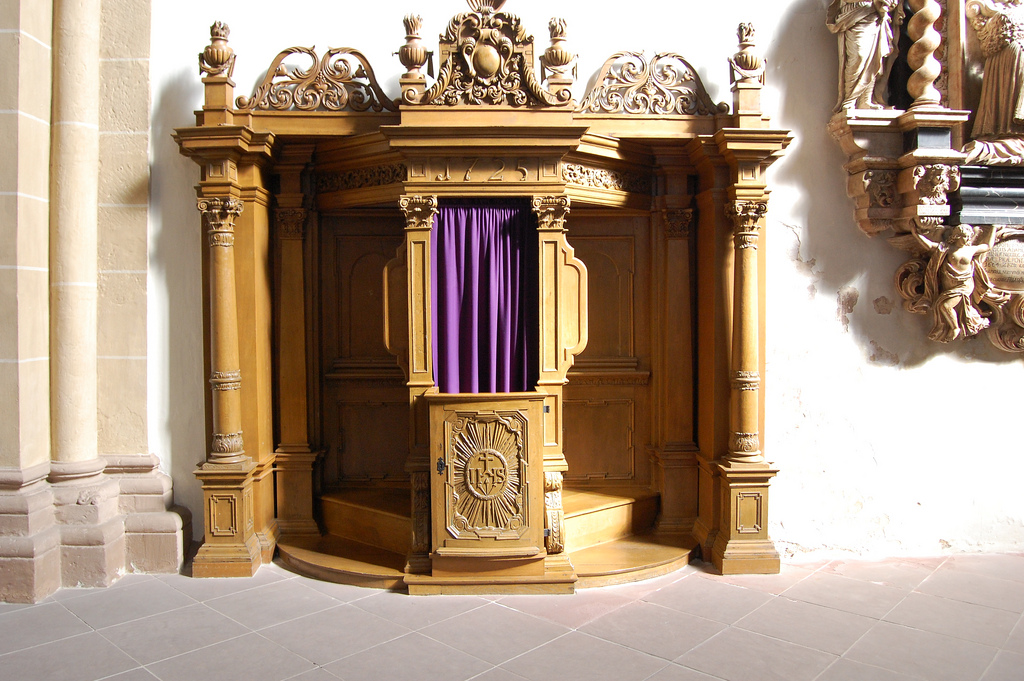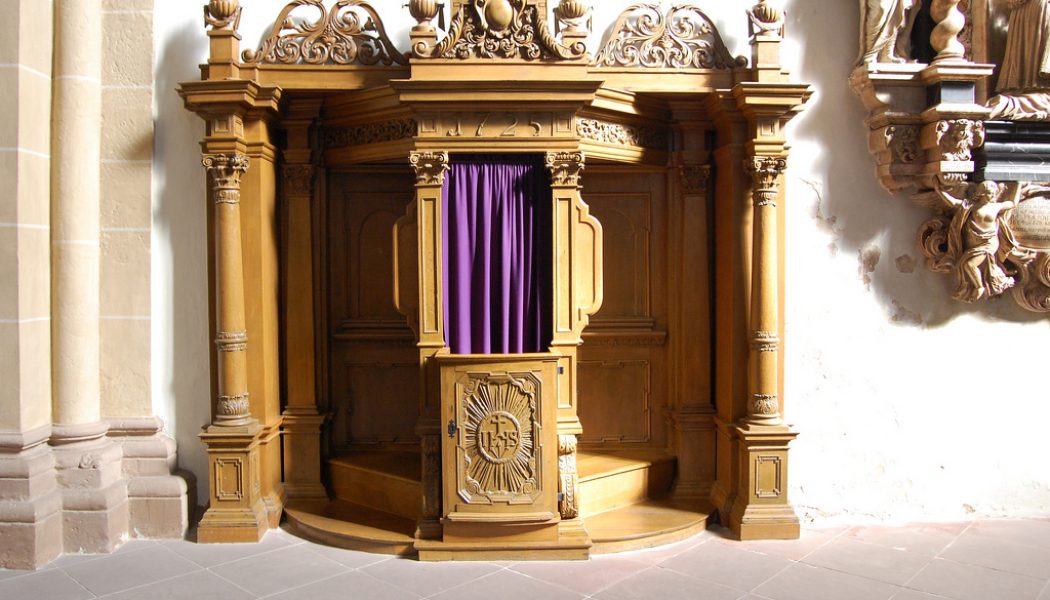
One of the greatest gifts that Jesus gave to the Church, and to each and every one of us, is the Sacrament of Confession. If we really understood this great Sacrament, then we would have recourse to it with greater, faith, trust, frequency, and preparation.
Literary Style
The literary style that we follow will be that of a brief and clear catechesis on the Sacrament of Confession. We hope and pray that all will profit immensely by this work, and hope that many souls will be drawn back to the merciful Heart of Jesus who beckons all to come to Him: “Come to me all of you who are weary and I will give your rest…”
Fifty Things to Know About Confession
1. Who?
Who instituted the Sacrament of Confession? As is true with all of the seven Sacraments, it was Our Lord and Savior Jesus Christ who instituted the Sacrament of Confession.
2. When?
When was the Sacrament of Confession instituted? How wonderful and providential is God’s love for us! Jesus actually instituted the Sacrament of Confession Easter Sunday — the day that He rose from the dead.
3. Where?
Where was this Sacrament instituted? That first Easter Sunday night, the same day that Jesus rose from the dead, the Sacrament of Confession was instituted in the Upper Room that we call The Cenacle.
4. What context?
The Apostles were locked in the Upper Room filled with fear when Jesus came through the door and breathed on them the Holy Spirit.
5. What were the words of institution?
Upon breathing the Holy Spirit upon the Apostles, Jesus said these words thereby instituting the Sacrament of Confession: Receive the Holy Spirit. Whose sins you shall forgive, they shall be forgiven; whose sins you bind, they shall be held bound.
6. Where is this in the Bible?
This short episode can be found in the fourth Gospel of Saint John—John 20: 21-23.
7. Who has the power to forgive sins?
It is only Jesus who has the power to forgive sin, all sins, because sin is an offense against God.
8. What about the priest?
However, in His infinite wisdom and divine providence, Jesus chose men that we call priests to be the ministers and the instruments through which Jesus forgives sins.
9. But isn’t the priest a sinner himself?
It is true that the priest is himself a sinner and has to go to confession to another priest to have his sins forgiven. However, through the Sacrament of Holy Orders, and permission of the local Ordinary, the Bishop, the priest is given the power to forgive sins in the name of Jesus and the Church, His Mystical Body.
10. Who should go to Confession?
All should have recourse to the Sacrament of Confession and the reason could not be clearer than the sunshine at midday: all are sinners and have fallen short of the glory of God.
11. Where?
The name of the traditional place to confess is simply called The Confessional.
12. What if I confess directly to God, instead?
No, this is wrong! Jesus wants us to confess our sins through the person of the priest.
13. When must we confess?
The Easter Duty commands us to confess at least once a year, but this is a minimalist view of this Sacrament. The saints of the past and good spiritual directors encourage the practice of frequent confession.
14. Frequent Confession?
It cannot be specified and labelled mathematically. However, it is a good practice to strive to go to confession at least once a month.
15. What are qualities of a good confession?
In the Diary of Divine Mercy in My Soul (Saint Faustina Kowalska) there are three highlighted qualities that make for a good confession: transparency, humility, and obedience.
16. Transparency?
This means that the penitent should try to be as clear, honest, and sincere as possible.
17. Humility?
This means telling the absolute truth and to avoid trying to justify, rationalize, minimize the reality of the sin confessed. You must humbly admit who you are before the Lord.
18. Obedience?
The penitent should try to obey the counsel and the advice of the confessor who actually represents Jesus.
19. Names of this Sacrament?
There are various names for this wonderful Sacrament. Confession, Penance, Reconciliation, Mercy, Forgiveness. All these terms represent a different dimension of this great Sacrament.
20. What are the five classical steps for making a good confession?
- Examination of conscience,
- contrition,
- firm purpose of amendment,
- confession of sins to a priest,
- and carrying out the penance.
21. How do I make an examination of conscience?
One of the best ways is to get hold of a good booklet going over the Ten Commandments. Read each of the Ten Commandments while examining your own life in light of God’s commandments.
22. Contrition?
This means that we must have true sorrow for our sins to make a good confession.
23. What about imperfect contrition?
This is sorrow for serious sin due to Fear of the Lord. It means that one will avoid mortal sin for fear of the punishment of God if this sin is not rejected. This is good, but perfect contrition is better.
24. Perfect contrition?
This should be our aim! In this state, we are sorry for our sins because we know that we hurt God, who loves us. Consequently, we want to avoid sin because we want to love God, who loves us so much. We should beg for this grace before every confession
25. Firm purpose of amendment?
This means very simply that, as an extension of true sorrow for sin, we will try to avoid the near occasion of sin.
26. What does that mean?
It means that we should not play with fire. We should make a concerted effort to avoid any person, place, thing or circumstance that could lead us into sin. We should avoid walking on a slippery slope; otherwise, we will fall!
27. Confess to a priest?
Once we have examined our conscience thoroughly and elicited with God’s grace, true sorrow, we are ready to confess to the priest, who, as mentioned earlier, represents Christ Jesus the Healer, the Divine Physician.
28. What are we obliged to confess?
To make a good confession, we are obliged to confess all of our mortal sins, as well as the number and kind.
29. What is a mortal sin?
A mortal (deadly) sin, once committed, causes the loss of God’s grace and friendship in the soul.
30. What are the conditions of a mortal sin?
There are three:
- 1) Grave matter,
- 2) Full knowledge,
- 3) Full consent of the will.
31. Watch the door!
Upon entering, it is always good to close the door to the confessional; otherwise, the persons waiting outside might hear your sins.
32. Pray for the priest.
On one occasion, Saint Faustina left the confessional intranquil. When Jesus appeared to her, she asked why. Jesus responded by saying: You did not pray for the priest before you entered the confessional. So, before you enter the confessional say at least a short prayer for your confessor.
33. Should I confess behind the screen or face-to-face?
In many parishes, you have the option! You can either go behind the screen and be anonymous or choose to confess to the priest, face to face. It’s your choice.
34. How to start?
The traditional way to start off confession is the following: Bless me Father, for I have sinned. My last confession was a month ago (the time since your last confession) and these are my sins. Then you tell your sins to the priest with humility, trust, and confidence in God’s mercy.
35. What next?
Listen to the words of the priest: advice, counsel, suggestions, admonitions, encouragement, at times correction…
36. How should I conclude?
Then to conclude, you, as the penitent, pray what is called the Act of Contrition. You should try to memorize the Act of Contrition. If not, the priest can help you by giving you one to read. But try to say it with true meaning and true repentance!
37. Absolution?
These are the words that the priest says after you have finished your confession. And I absolve you of your sins, in the Name of the Father, and of the Son and of the Holy Spirit.
38. What happens next?
How marvelous! With the words of absolution, the most Precious Blood of Jesus descends into your soul and washes you clean of all of your sins. You are forgiven and set free of all of your sins!
39. Gratitude and exit
Thank the priest, who represents Jesus, and then leave. Now you leave the confessional door open so that the next penitent can enter.
40. What about penance?
As soon as possible, you should try to carry out the penance that the priest has given to you. This is the fifth and an important part of the Sacrament of Confession.
41. What if somebody intentionally holds back their sins?
In this case, the Confession would be sacrilegious. None of the sins would be forgiven.
42. How can we correct that?
The penitent should go back to the priest and mention all of the sins in the previous confession as well as the sin that was held back; also, he should mention the fact that he is truly sorry for not telling the total truth in the past confession. Once this is done, all the sins will be forgiven and he can start a new life!
43. What if I accidentally forget to mention a sin?
The confession is still good, but the following time that the penitent goes to confession he should mention the sins that were forgotten.
44. What is the seal of the confessional?
The priest is bound to maintain absolute secrecy as to all that he has heard in the context of the Sacrament of Confession. Your confession is between you, the priest, and God Himself.
45. Have priests been martyred for not breaking the seal?
Yes, there have been priests who preferred to die rather than to break the Seal of the Confession. One of these priests was the priestly confessor of a Queen. The name of the priest is Saint John Nepomucene.
46. What are some effects of Confession?
All of the Sacraments communicate grace. However, each Sacrament confers a specific sacramental grace that differentiates it from the others. The specific sacramental grace of the Sacrament of Confession is that of healing.
47. Healing?
Yes, healing! When we commit sin, we wound our soul. But when we make a good confession, these wounds are healed by the loving touch of Jesus, the Divine Physician.
48. Are there preventative steps?
Going to confession can be compared to going to make a visit with a Doctor. The Doctor can give you curative medicine — when you are already sick. Or the Doctor can give you preventive medicine — like a Flu-shot, so as to prevent a future sickness. Making a good confession strengthens us against sinning in the future.
49. How about a Biblical passage to prepare for Confession?
Reading and prayerfully meditating upon Lk. 15: 11-32 can be of immense value. This is the Parable of the Prodigal Son or if you like, the Parable of the Merciful Father.This Parable will augment in our souls a great trust in the infinite mercy of the Heart of Jesus.
50. What are the positive fruits of a good confession?
There are many! Here are a few:
- (1) FORGIVENESS OF SINS, both mortal and venial.
- (2) FRIENDSHIP WITH GOD. Once forgiven of mortal sin, friendship is again established between us and God.
- (3) SANCTIFYING GRACE RESTORED. Also, sanctifying grace is restored to the soul.
- (4) HUMILITY. It takes humility to confess well. Therefore, we grow in humility of heart. Jesus loves those who are humble of heart
- (5) CAPTIVES SET FREE. Sin is slavery and confession sets the captive free!
- (6) PEACE OF SOUL. Sin robs our soul of peace. Confession, on the contrary, restores peace.
- (7) JOY IN THE LORD. Another rotten fruit of sin is sadness. Confession fills our hearts with joy in God’s presence.
- (8) SELF-KNOWLEDGE. Furthermore, by frequent confession we increase in self-knowledge and can avoid future falls.
- (9) PURITY OF SOUL. Our soul becomes more pure and our prayer life improves.
- (10) BETTER HOLY COMMUNIONS. Saint Ignatius makes an intimate connection between making good confessions and better Communions. The more clear the soul, the more abundant the Eucharistic sun can shine in that soul!
Conclusion
We hope that all who have prayerfully read this short catechism on the Sacrament of Confession will feel motivated to approach the throne of God’s Infinite mercy through this Sacrament and be able to taste and see the goodness and the mercy of God. May Our Lady of Divine Mercy pray for us that we will trust totally in the mercy of Jesus in His Church and in the Sacrament of His Mercy, the Sacrament of Confession.
Give thanks to the Lord for he is good; His mercy endures forever.
image: Angela Marie from NRW/Germany / CC BY








